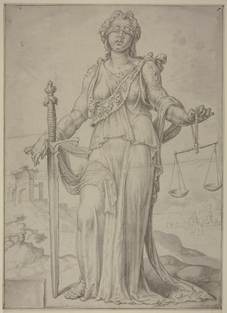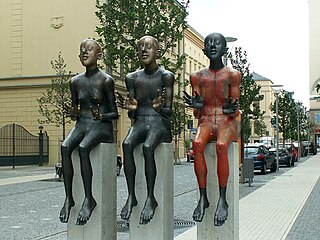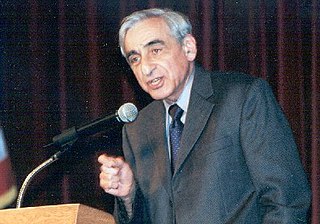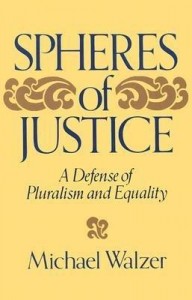Related Research Articles

Justice, in its broadest sense, is the principle that people receive that which they deserve, with the interpretation of what then constitutes "deserving" being impacted upon by numerous fields, with many differing viewpoints and perspectives, including the concepts of moral correctness based on ethics, rationality, law, religion, equity and fairness. The state will sometimes endeavour to increase justice by operating courts and enforcing their rulings.

Distributive justice concerns the socially just allocation of resources. Often contrasted with just process, which is concerned with the administration of law, distributive justice concentrates on outcomes. This subject has been given considerable attention in philosophy and the social sciences.

A Theory of Justice is a 1971 work of political philosophy and ethics by the philosopher John Rawls, in which the author attempts to provide a moral theory alternative to utilitarianism and that addresses the problem of distributive justice. The theory uses an updated form of Kantian philosophy and a variant form of conventional social contract theory. Rawls's theory of justice is fully a political theory of justice as opposed to other forms of justice discussed in other disciplines and contexts.

Charles Margrave Taylor is a Canadian philosopher from Montreal, Quebec, and professor emeritus at McGill University best known for his contributions to political philosophy, the philosophy of social science, the history of philosophy, and intellectual history. His work has earned him the Kyoto Prize, the Templeton Prize, the Berggruen Prize for Philosophy, and the John W. Kluge Prize.

Political sociology is an interdisciplinary field of study concerned with exploring how power and oppression operate in society across micro to macro levels of analysis. Interested in the social causes and consequences of how power is distributed and changes throughout and amongst societies, political sociology's focus ranges across individual families to the State as sites of social and political conflict and power contestation.

Toleration is the allowing, permitting, or acceptance of an action, idea, object, or person which one dislikes or disagrees with. Political scientist Andrew R. Murphy explains that "We can improve our understanding by defining "toleration" as a set of social or political practices and "tolerance" as a set of attitudes.". Random House Dictionary defines tolerance as "a fair, objective, and permissive attitude toward those whose opinions, beliefs, practices, racial or ethnic origins, etc., differ from one's own".

The public sphere is an area in social life where individuals can come together to freely discuss and identify societal problems, and through that discussion influence political action. A "Public" is "of or concerning the people as a whole." Public Sphere is a place common to all, where ideas and information can be exchanged. Such a discussion is called public debate and is defined as the expression of views on matters that are of concern to the public—often, but not always, with opposing or diverging views being expressed by participants in the discussion. Public debate takes place mostly through the mass media, but also at meetings or through social media, academic publications and government policy documents. The term was originally coined by German philosopher Jürgen Habermas who defined the public sphere as "made up of private people gathered together as a public and articulating the needs of society with the state". Communication scholar Gerard A. Hauser defines it as "a discursive space in which individuals and groups associate to discuss matters of mutual interest and, where possible, to reach a common judgment about them". The public sphere can be seen as "a theater in modern societies in which political participation is enacted through the medium of talk" and "a realm of social life in which public opinion can be formed".

Michael Laban Walzer is a prominent American political theorist and public intellectual. A professor emeritus at the Institute for Advanced Study (IAS) in Princeton, New Jersey, he is editor emeritus of Dissent, an intellectual magazine that he has been affiliated with since his years as an undergraduate at Brandeis University. He has written books and essays on a wide range of topics—many in political ethics—including just and unjust wars, nationalism, ethnicity, Zionism, economic justice, social criticism, radicalism, tolerance, and political obligation. He is also a contributing editor to The New Republic. To date, he has written 27 books and published over 300 articles, essays, and book reviews in Dissent, The New Republic, The New York Review of Books, The New Yorker, The New York Times, Harpers, and many philosophical and political science journals.

Social stratification refers to a society's categorization of its people into groups based on socioeconomic factors like wealth, income, race, education, ethnicity, gender, occupation, social status, or derived power. As such, stratification is the relative social position of persons within a social group, category, geographic region, or social unit.
The nature of capitalism is criticized by anarchists, who reject hierarchy and advocate stateless societies based on non-hierarchical voluntary associations. Anarchism is generally defined as the libertarian philosophy which holds the state to be undesirable, unnecessary and harmful as well as opposing authoritarianism, illegitimate authority and hierarchical organization in the conduct of human relations. Capitalism is generally considered by scholars to be an economic system that includes private ownership of the means of production, creation of goods or services for profit or income, the accumulation of capital, competitive markets, voluntary exchange and wage labor which has generally been opposed by anarchists historically. Since capitalism is variously defined by sources and there is no general consensus among scholars on the definition nor on how the term should be used as a historical category, the designation is applied to a variety of historical cases, varying in time, geography, politics and culture.
In ethics, value pluralism is the idea that there are several values which may be equally correct and fundamental, and yet in conflict with each other. In addition, value-pluralism postulates that in many cases, such incompatible values may be incommensurable, in the sense that there is no objective ordering of them in terms of importance. Value pluralism is opposed to value monism.

Global justice is an issue in political philosophy arising from the concern about unfairness. It is sometimes understood as a form of internationalism.
David Leslie Miller is an English political theorist. He is Professor of Political Theory at the University of Oxford and an Official Fellow of Nuffield College, Oxford. He previously lectured at the University of Lancaster and the University of East Anglia. He received his Bachelor of Arts degree from the University of Cambridge, and his Bachelor of Philosophy and Doctor of Philosophy degrees from the University of Oxford. Previous works include Social Justice, On Nationality and Citizenship and National Identity. Miller is known for his support of a modest form of liberal nationalism.

Spheres of Justice: A Defense of Pluralism and Equality is a 1983 book by the philosopher Michael Walzer.
Luck egalitarianism is a view about distributive justice espoused by a variety of egalitarian and other political philosophers. According to this view, justice demands that variations in how well-off people are should be wholly determined by the responsible choices people make and not by differences in their unchosen circumstances. This expresses the intuition that it is a bad thing for some people to be worse off than others through no fault of their own.

Ian Shapiro is a Sterling Professor of Political Science at Yale University. He served as the Henry R. Luce Director of the MacMillan Center at Yale University from 2004 to 2019. He is known primarily for interventions in debates on democracy and on methods of conducting social science research. In democratic theory, he has argued that democracy's value comes primarily from its potential to limit domination rather than, as is conventionally assumed, from its operation as a system of participation, representation, or preference aggregation. In debates about social scientific methods, he is chiefly known for rejecting prevalent theory-driven and method-driven approaches in favor of starting with a problem and then devising suitable methods to study it. His most recent work, coauthored with Michael J. Graetz, Wolf at the Door: The Menace of Economic Insecurity and How to Fight It, proposes achievable policies and strategies to mitigate economic insecurity in the United States.
Agonism is a political and social theory that emphasizes the potentially positive aspects of certain forms of conflict. It accepts a permanent place for such conflict in the political sphere, but seeks to show how individuals might accept and channel this conflict positively. Agonists are especially concerned with debates about democracy, and the role that conflict plays in different conceptions of it. The agonistic tradition to democracy is often referred to as agonistic pluralism. Beyond the realm of the political, agonistic frameworks have similarly been utilized in broader cultural critiques of hegemony and domination, as well as in literary and science fiction.

Just and Unjust Wars: A Moral Argument with Historical Illustrations is a 1977 book by the philosopher Michael Walzer. Published by Basic Books, it is still in print, now as part of the Basic Books Classics Series. A second edition was published in 1992, a third edition in 2000, a fourth edition in 2006, and a fifth edition in 2015. The book resulted from Walzer's reflections on the Vietnam War.
Political ethics is the practice of making moral judgements about political action and political agents. It covers two areas. The first is the ethics of process, which deals with public officials and their methods. The second area is the ethics of policy, which concerns judgments surrounding policies and laws.
Clinical pluralism is a term used by some psychotherapists to denote an approach to clinical treatment that would seek to remain respectful towards divergences in meaning-making. It can signify both an undertaking to negotiate theoretical difference between clinicians, and an undertaking to negotiate differences of belief occurring within the therapeutic relationship itself. While the notion of clinical pluralism is associated with the practice of psychotherapy, similar issues have been raised within the field of medical ethics.
References
- ↑ Lang, Richard (2018). Complex equality and the Court of Justice of the European Union: Reconciling Diversity and Harmonization. Leiden: BRILL. p. 22. ISBN 9789004299993.
- ↑ Farrelly, Colin (2004). Contemporary Political Theory: A Reader. London: SAGE Publications Ltd. p. 109. ISBN 0761949070.
- ↑ Browning 1997, p. 142.
- ↑ Walzer 1983, p. 19.
- 1 2 Chatterjee, Deen (2011). Encyclopedia of Global Justice: A - I. Dordrecht: Springer Science+Business Media. p. 177. ISBN 9781402091599.
- 1 2 Bauer, Harry; Brighi, Elisabetta (2009). Pragmatism in International Relations. Oxon: Routledge. p. 162. ISBN 978-0203885093.
Bibliography
- Browning, Gary K. (1997). "Concepts and Issues". In Axford, Barrie; Browning, Gary K.; Huggins, Richard; Rosamond, Ben; Turner, John (eds.). Politics: An Introduction (1st ed.). London: Routledge (published 2005). ISBN 978-0-203-97825-2.
- Walzer, Michael (1983). Spheres of Justice: A Defense of Pluralism and Equality . New York: Basic Books (published 2008). ISBN 978-0-7867-2439-0.